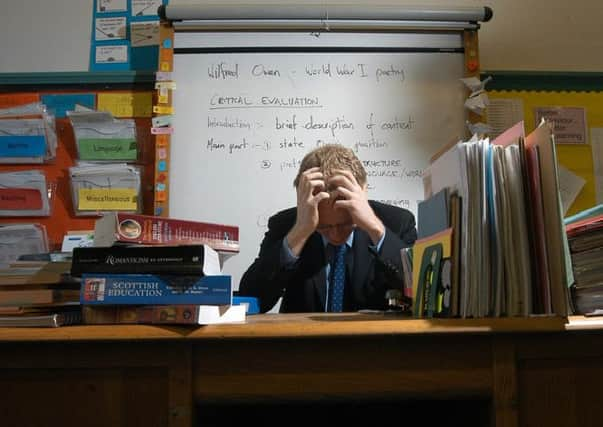Scots teachers ‘stressed out’ by severe workload


Almost 7,000 teachers took part in the study, which found that stress levels across the profession are very high and satisfaction is low.
Just a third (33 per cent) of those questioned said they feel generally satisfied in their working life, while same amount said they would recommend teaching as a career. None of those surveyed said they never feel stressed at work.
Advertisement
Hide AdAdvertisement
Hide AdThe Educational Institute of Scotland (EIS), which commissioned the survey, said teachers and lecturers appear to feel they are “climbing a never-ending mountain that makes more and more demands of them, with little prospect of respite”.
The union said that unnecessary paperwork is having a negative impact on the time available for core learning and teaching in the classroom.
EIS general secretary Larry Flanagan said: “Almost 7,000 teachers made the time to take part in this survey, which represents a significant proportion of both EIS membership and the Scottish teaching profession overall.
“The survey results confirm the deep-set impact of workload pressures on teachers and lecturers, largely arising out of the changes to the curriculum, and paint a worrying picture of a profession under the cosh.
“Teaching is a noble profession but the fact that almost half of the respondents would be reluctant to recommend it as a career speaks volumes for the mood of teachers and lecturers.”
The survey found that fewer than one in ten (9 per cent) of respondents are satisfied with workload in general while fewer than two in five (16 per cent) reported no current work-related stress.
Just over a quarter (26 per cent) said they feel very well, health-wise, in their job.
The study found that teachers and lecturers, as well as being dissatisfied, do not feel they are being heard, valued as professionals or given the support they require.
Advertisement
Hide AdAdvertisement
Hide AdIt concluded: “As a result, the bank of goodwill that drives their desire to remain in the profession is steadily decreasing and their warning is that it is not limitless and will indeed run out.”
The EIS called for action to tackle the excessive workload and working hours and the very large amount of unnecessary paperwork.
It also said the number and speed of changes, in particular to the Curriculum for Excellence, and issues with management/leadership, need to be addressed.
Mr Flanagan told BBC Radio Scotland: “We are seeing much higher levels of stress-related illness and absence from school. Given the supply crisis, that quite often means classes aren’t being covered so the lack of well-being on the part of teachers translates into a lack of well-being in the school.
“If we want teachers to give their very best in the classroom then you want them to have a much more positive attitude than clearly is there in the survey results.”
He warned that teachers may consider industrial action if the problems are not addressed.
Mr Flanagan said: “Our AGM comes up in June and there are a number of motions there calling for industrial action of various sorts in relation to workload.
“We’d rather reach an accommodation with the Scottish Government and local government around implementing the agreed changes that are already there in the system but if there’s no progress on that then I think our members will look to take work to contract, for example, as a way of controlling workload.”
Advertisement
Hide AdAdvertisement
Hide AdA Scottish Government spokesman said: “The Scottish Government takes support for teachers very seriously and continues to work with teachers’ representatives and local authorities to address any points, including the workload of those at the front line delivering lasting improvements, that will benefit our young people and economy for years to come.
“There is excellent work being done in schools across the country and we are committed to further improving our education system, as shown by the unprecedented package of support and resources provided to implement Curriculum for Excellence.
“We are working with partners, including the EIS, to tackle issues of bureaucracy and unnecessary paperwork in order to free teachers to concentrate on what they do best, the delivery of teaching and learning. As part of this, Education Scotland and the EIS are holding a series of joint events on tackling bureaucracy.”
SEE ALSO: